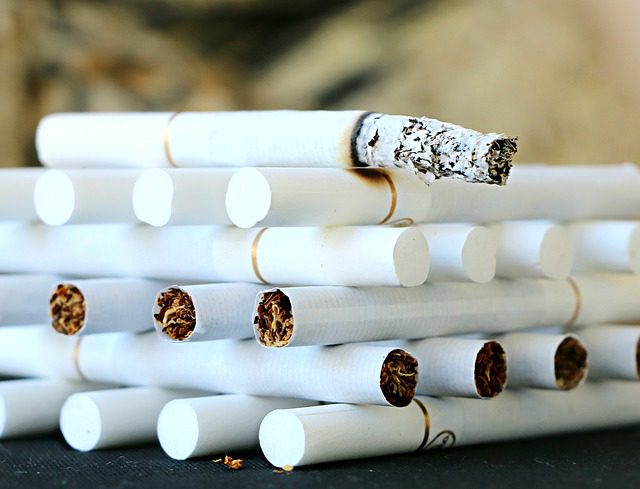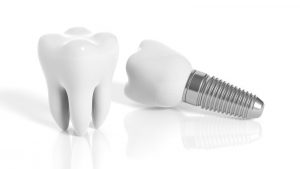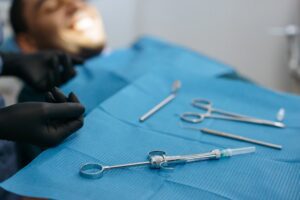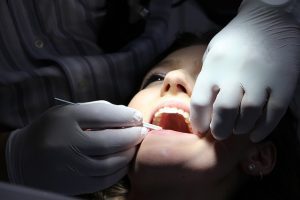Everyone knows that smoking is bad for you; high school health class taught us that. And national campaigns like The Truth Initiative have national PSA advertising not only to stop teens from becoming smokers, but to spread information and resources about quitting to adults who already do smoke.
Decades of research and class action suits against Big Tobacco have shown that the long-term health risks for consuming tobacco in any way are numerous. And what’s more: they’re very real. Between lung cancers, heart disease, weakened immune systems and other damage to your internal organs, smoking really just isn’t worth it.
And it doesn’t just effect your heart and lungs; it can have a devastating impact on the health of your mouth and jaw – whether through cavities, oral cancers, jaw deterioration or gum disease, among other things. It’s no wonder your dentist keeps telling you to quit.
Why Is Smoking Tobacco So Bad for You?
That’s a good question, especially since people have been chewing and/or smoking tobacco for more than 12000 years, as the Wishbone site at Utah has proven. If it’s so awful, why have we been using it for so long? As a rebuttal, we’d cite alcohol. Is it bad for you? Sure. Do the good feelings it imbues lead us to continue to use it regardless of what we know about its negative effects? Yes.
But what makes smoking, chewing and vaping so dangerous? There are three major players that make smoking a bad idea:
- Nicotine: Nicotine is a highly addictive stimulant that can increase heart rate and blood pressure. It can also damage the lining of the arteries, which can lead to heart disease and stroke.
- Tar: Tar is a thick, black substance that is produced when tobacco is burned. It contains hundreds of chemicals, many of which are known to be carcinogenic.
- Carbon monoxide: Carbon monoxide is a gas that is produced when tobacco is burned. It can reduce the amount of oxygen that is delivered to the body’s tissues, which can damage organs and tissues.
On top of that, you’ve got the 100+ additional carcinogenic compounds in cigarettes, and the super-high nicotine concentrations in vapes. And then there are the heavy metals, which you’ll find in both chew and combustibles. Do you know what the side effects of cadmium are? Everything from kidney damage to weakened bones and heart problems.
How Smoking Affects Your Whole Mouth, Not Just Your Teeth
So, how does the toxic nature of tobacco wreak havoc on your mouth? Many people think that the effects on the mouth from smoking regularly are limited to yellowed teeth and cavities. But it’s actually much worse than that. And by the way, vaping doesn’t get a pass here – there’s nicotine and heavy metals in that, too.
What are the other issues smoking might cause when it comes to your oral health? Here are just a few:
- Tooth decay severe enough to lose teeth or to need teeth extracted
- Gum/periodontal disease resulting from nicotine plaque buildup at the gum line
- A weakened immune system, which increases your risk of:
- Deterioration of the jaw bone
- Movement of the teeth
- Lowered rate of salivation
- Infection after an oral surgery like a tooth extraction or tooth replacement
Other mouth-related consequences of smoking tobacco can include reduced taste and smell, chronic cough, voice changes, and, of course, the decreased immune function that contributes to increased risk of oral diseases and cancers.
If you allow the damage to your teeth and gums to become too severe before you decide to quit, a full mouth reconstruction may become almost impossible. Dental implants to replace teeth lost to decay require sturdy jaw bone that I capable of growing around the dental implant’s root. And while dental bone grafting can help to some extent, damage from smoking can present two main issues that will preclude you from being able to get a dental bone graft:
- the existing bone is too damaged for a graft and
- the bone doesn’t have enough ability to use the graft to help itself regenerate.
Imagine being 30 years old, having to have all your teeth extracted and your jaw stabilized through oral surgeries, for your only option to be a full set of dentures. Not cute.
How Smoking Affects Your Whole Body, Not Just Your Mouth
The hazardous nature of tobacco consumption doesn’t stop at the mouth. It continues right down your throat to affect nearly every system in your body. And when you factor in the fact that oral health itself is associated with respiratory and cardiac conditions, we’re already off to a bad start. Other consequences that can arise from using tobacco include:
Cardiovascular Effects:
- Increased risk of heart disease, including coronary artery disease.
- Elevated blood pressure.
- Narrowing of blood vessels (vasoconstriction) and reduced blood flow, increasing the risk of blood clots and strokes.
- Increased risk of peripheral artery disease (PAD).
- Weakening of blood vessel walls, leading to aneurysms.
Respiratory Effects:
- Chronic obstructive pulmonary disease (COPD), including chronic bronchitis and emphysema.
- Increased risk of respiratory infections, like pneumonia and bronchitis.
- Reduced lung function and capacity.
Cancer:
- Increased risk of lung cancer, as well as cancers of the throat, esophagus, pancreas, bladder, kidney, and cervix.
- Secondhand smoke exposure can also increase the risk of lung cancer in non-smokers.
Reproductive and Sexual Health:
- Reduced fertility in both men and women.
- Increased risk of erectile dysfunction in men.
- Complications during pregnancy, such as preterm birth and low birth weight.
Bone Health:
- Increased risk of osteoporosis and fractures due to reduced bone density.
Vision Problems:
- Increased risk of age-related macular degeneration, a leading cause of blindness in older adults.
Immune System:
- Weakened immune response, making the body more susceptible to infections.
Mental Health:
- Increased risk of depression and anxiety.
- Nicotine addiction can contribute to psychological dependence.
- Increased risk of developing a substance use disorder.
Aging Process:
- Accelerated aging, leading to premature wrinkles and other skin changes.
Gastrointestinal & Metabolic Issues:
- Increased risk of peptic ulcers.
- Gastroesophageal reflux disease (GERD) symptoms can worsen.
- Nicotine can lead to increased appetite and weight gain when quitting smoking.
- Chronic diseases, including diabetes, can be worsened by smoking.
Cognitive Decline:
- Some studies suggest a link between smoking and an increased risk of cognitive decline and dementia.
On the Rebound: Quitting is a Great Choice No Matter How Long You’ve Smoked
The good news is, it’s never too late to stop using tobacco. Research has shown unequivocally that when people quit smoking, their overall health immediately starts to improve, and that includes their oral health. Your risk of tooth loss and tooth decay reduce dramatically, as does your risk of mouth diseases like necrotizing ulcerative gingivitis, which is a particularly nasty gum disease that causes your gums to develop ulcers and gum tissue to die.
One study found that of the people who quit smoking after the initial study, in less than one year they had significantly less symptoms of gum disease than the participants who hadn’t quit smoking. Another study showed that people who quit smoking have the same risk of gum disease as non-smokers. For context, smokers have an 80% higher chance of developing gum disease than people who don’t smoke.
Quitting smoking also means your blood flow and immune system go back to normal, meaning bone loss and susceptibility to oral diseases, bone loss and infection lessen significantly. When you take those harmful chemicals and compounds away, you give your body back the ability to build back its immune system and begin to heal itself. Several health factors you’ll see real improvements in are:
- Lung Function: One of the most noticeable improvements is in lung function. Within days to weeks of quitting, your lung capacity and ability to breathe more easily can start to improve. Over time, the risk of chronic obstructive pulmonary disease (COPD) and other respiratory conditions can decrease. As well, the risk of respiratory infections decreases after quitting, and your body’s ability to clear mucus and fight off infections can improve.
- Reduced Risk of Heart Disease: The risk of heart disease decreases when you quit smoking. Within a year, your risk of heart attack begins to drop, and it continues to decline over time. Also, smoking narrows blood vessels and increases the risk of blood clots. When you quit, your circulation can improve, reducing the risk of peripheral artery disease and stroke.
- Lowered Cancer Risk: While the damage caused by smoking can increase the risk of various cancers, quitting smoking reduces this risk. Over time, your body’s ability to repair damaged DNA and reduce the risk of lung and other smoking-related cancers can improve.
- Sense of Taste and Smell: Smokers often experience a dulled sense of taste and smell. These senses can gradually return to normal after quitting.
- Mental Health: Quitting smoking can lead to improvements in mental health, reducing symptoms of anxiety and depression.
- Skin and Appearance: Your skin can benefit from quitting smoking. Skin can look healthier and more youthful, and you may experience fewer wrinkles and a better complexion.
- Fertility: For those trying to conceive, quitting smoking can improve fertility in both men and women.
A Wilmington Oral Surgeon Restoring Smiles Damaged from Tobacco Use
If you’ve been a chronic chewer or smoker of tobacco, chances are it’s done a number on your teeth and gums, maybe even your jaw. Gum recession and tooth loss doesn’t only hurt your self-esteem and mental health, but your oral health as well. However, with our cutting-edge approach to holistic oral surgery and other intervention techniques, we can make the most of your situation and reconstruct your smile to looking, feeling and working great.
It’s always a good time to quit tobacco. Congratulate yourself with a visit to our office for a consultation with our oral surgeon about what we can do to give you back the smile you deserve.
For resources on quitting:
- American Cancer Society: 1-866-QUIT-NOW (1-866-784-8454)
- American Lung Association: 1-800-LUNGUSA (1-800-586-4872)
- gov
- MyQuitCoach smartphone app










